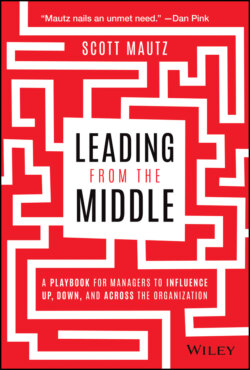Читать книгу Leading from the Middle - Scott Mautz - Страница 17
Omnipotence
ОглавлениеNot knowing can feel like a cardinal sin when you're leading from the middle. But as much as it might feel like it, your job isn't to know everything. In fact, a client I keynoted for had the following sentence painted on the wall in their headquarters lobby: “There's a cost to knowing.” It's a reminder to their managers that trying to know everything before moving forward comes at the cost of speed, missed opportunities, and more important priorities neglected elsewhere. For certain, it takes time and resources to know things. Make that known and be aware of the tradeoffs involved for having personal knowledge on a subject. Then, discern if it's worth you personally knowing it. In fact, focus more on discerning what you should know than trying to know everything. Just as important is to build a knowledge system where, if you don't have the answer, you can quickly access someone who will.
Then try the insight‐driven plays that follow.
1. Regarding high pressure meetings where you're expected to have all the answers—know what you're truly expected to know, but don't stress out trying to plan for every contingency. Invest the time to prepare for the meeting and anticipate the questions most likely to come up, and be okay with leaning on the knowledge system you've built up for the rest. Ask yourself, “What would the meeting attendees want to know about the subject at hand? What concerns or issues might they have? What are other sources I can have at the ready to answer questions outside my direct realm of expertise?” It's about instilling confidence and an unswerving faith that you and your knowledge system have things covered, not that you personally have the answer to every question.
2. Take pride in what you've chosen not to know. For example, I used to refuse to know some of the smallest details of a project because of the cost of knowing that. I took pride in delegating and empowering others to have the knowledge in certain areas while I focused on knowing enough about that area to be able to ask the right questions and to instill confidence in those evaluating me.
3. Know that it's not about omnipotence, it's about omnipresence. Leaders from the middle should be everywhere in their business, leaving an imprint on virtually everything within their purview (within reason and within boundaries, as I'll discuss in a moment). It requires thoroughly knowing the fundamentals of your business inside and out, but that doesn't come from personally knowing everything. It comes from being present and engaged enough in all aspects of the business (with enough attention to the fundamentals) and by being inclusive and interested enough to engage with all the experts on your business.
